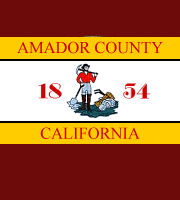





|
|
Jackson, California | ||
|
Ratto Theatre Site - (Historical Site) The original Ratto Theatre was here. On December 1911, it opened as the Jackson Theatre. This was a popular site for the town's boxing matches also. Now its just a vacant lot. |
|
|
|
145 Main Street It wasn't until 1855 before fire destroyed a major portion of the town. It started about where Placer Savings on Main is now, and swept southerly toward the creek. It it hadn't been for the aforementioned Fixary brick building, it might have continued to the creek and further. |
|
|
139 Main Street But that blaze was mere introduction to the townwide conflagration that destroyed most of Jackson on August 23, 1862. Hot ashes carelessly dumped outside a Main Street frame ignited. A few hours later the whole town, except some downtown brick and outlying dwellings were ash and ember. |
|
|
|
135 Main Street If you look behind modern window treatments and various facades in downtown Jackson today, you'll discover that much of it arose following the 1862 great fire. |
|
|
Parking Lot Spot During the war, Jackson's two papers, the Confederate-phile Dispatch, published by Mississippian William Penry and the Ledger of the Unionist Tom Springer exchanged impassioned calumnies in their columns. |
|
|
So rank did the Dispatch's broadside against the Republicans and Lincoln became that, after Lincoln's assassination and a follow-up vindictive editorial, the federal cavalry, in the county for another reason, rode in darkness to Jackson on morning, cordoned off the Dispatch front and back, and arrested and imprisoned penry and his chief writer, L. P. Hall.
|
||

|
||
Information, photographs courtesy of the Amador County Archives, The Historical Marker Database, The Chronicling America Database, and Larry Cenotto, Amador County's Historian CONTACT US
|
||




